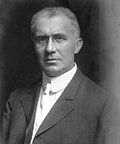1851
Lua error in package.lua at line 80: module 'Module:Ancient Olympiads' not found.
| Millennium: | 2nd millennium |
|---|---|
| Centuries: | 18th century – 19th century – 20th century |
| Decades: | 1820s 1830s 1840s – 1850s – 1860s 1870s 1880s |
| Years: | 1848 1849 1850 – 1851 – 1852 1853 1854 |
| 1851 by topic |
|---|
| Arts, history, and science |
| Countries |
|
|
| Lists of leaders |
| Birth and death categories |
| Establishments and disestablishments categories |
| Works category |
| Wikimedia Commons has media related to Lua error in Module:Commons_link at line 62: attempt to index field 'wikibase' (a nil value).. |
1851 Media
May 1: The Great Exhibition of 1851 opens in London.
September 18: The New York Times publishes its first issue
1851 (MDCCCLI) was a common year starting on Wednesday of the Gregorian calendar and a common year starting on Monday of the Julian calendar, the 1851st year of the Common Era (CE) and Anno Domini (AD) designations, the 851st year of the 2nd millennium, the 51st year of the 19th century, and the 2nd year of the 1850s decade. As of the start of 1851, the Gregorian calendar was 12 days ahead of the Julian calendar, which remained in localized use until 1923.
Events
- January 23 – The flip of a coin determines whether a new city in Oregon is named after Boston, Massachusetts, or Portland, Maine, with Portland winning.
- March 1 – Victor Hugo gives speech at the French national assembly and uses the phrase United States of Europe several times
- March 27 – First reported case of white men seeing Yosemite Valley.
- March 30 – A population census was taken of all people living in the United Kingdom.
- May 1 – The Great Exhibition of the Works of Industry of All Nations in the Crystal Palace, Hyde Park, London is opened by Queen Victoria. It runs until October 18.
- May 15 – Rama IV is crowed King of Thailand.
- July – The immortal game, a famous chess game, is played.
- July 1 – Colony of Victoria separates from New South Wales.
- July 29 – Annibale de Gasparis, in Naples, Italy discovers asteroid 15 Eunomia.
- August 22 – The yacht America wins the first America's Cup race (see Yachting).
- October 18 – The Great Exhibition in London is closed.
- November 13 – The Denny Party lands at Alki Point, the first settlers of what will become Seattle, Washington.
- December 2 – Louis Napoleon, president of France, dissolves French National Assembly and declares a new constitution to extend his term. Later he declares himself as an emperor Napoleon III. End of the Second Republic.
- December 24 – The Library of Congress burns.
- December 29 – The first YMCA opens, in Boston, Massachusetts.
Births
- January 17 – A. B. Frost, American illustrator (d. 1928)
- January 19 – Jacobus Kapteyn, Dutch astronomer (d. 1922)
- February 8 – Kate Chopin, American writer (d. 1904)
- March 27 – Vincent d'Indy, French composer and teacher (d. 1931)
- April 21 – Charles Barrois, French geologist (d. 1939)
- May 6 – Aristide Bruant, French cabaret singer and comedian (d. 1925)
- May 20 – Emil Berliner, telephone and recording pioneer (d. 1929)
- August 14 – Doc Holliday, American gambler and gunfighter (d. 1887)
- October 2 – Ferdinand Foch, French commander of allied forces in World War I (d. 1929)
- October 31 – Princess Louise of Sweden
- Robert Abbe, American surgeon (d. 1928)
- Ruperto Chapí, Spanish zarzuelist
- Tom Morris, Jr., Scottish golfer (d. 1875)
Deaths
- February 1 – Mary Shelley, British writer of Frankenstein
- August 28 – Thomas Livingstone Mitchell, Australian explorer
- September 14 – James Fenimore Cooper









